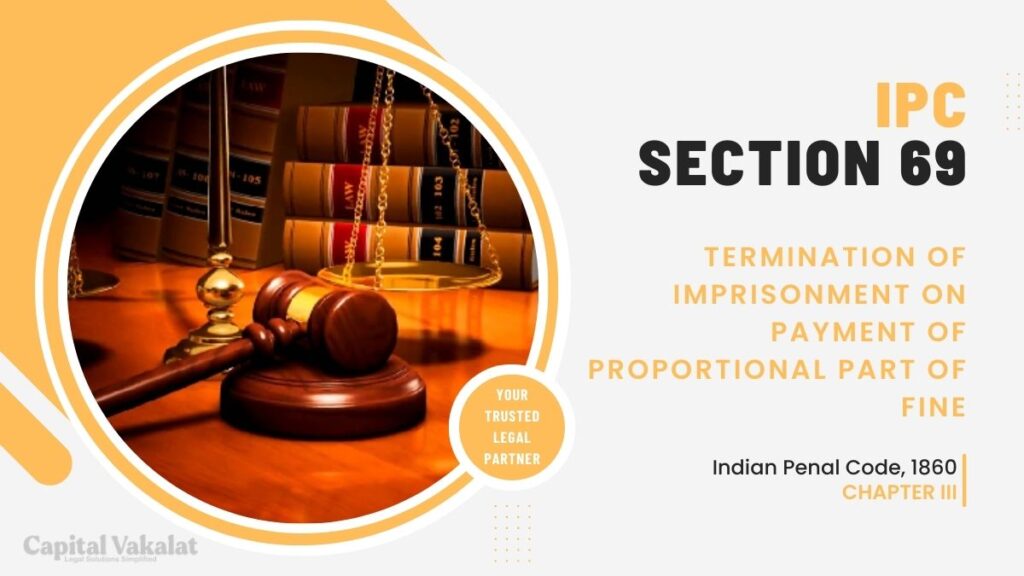In the realm of legal intricacies and the Indian Penal Code, Section 69 IPC stands as a significant provision. This legal provision is designed to offer individuals a way out of imprisonment by allowing them to pay a proportional part of the imposed fine.

In this comprehensive article, we will dissect Section 69 IPC, exploring its nuances, implications, and how it impacts the Indian legal landscape.
Understanding Section 69 IPC
Section 69 of the Indian Penal Code, 1860, deals with a fundamental aspect of criminal law – the payment of fines as an alternative to imprisonment. It is pivotal in ensuring a balance between penalizing wrongdoing and providing avenues for reform and retribution.
The Core Principle
The core principle of Section 69 IPC revolves around the idea that imprisonment can be terminated if the convicted person pays a proportionate part of the fine imposed as part of their sentence. This provision acknowledges that sometimes, monetary penalties can be more effective in achieving justice than incarceration.
The Context of the Offense
This provision is not applicable to all offenses. It is primarily relevant to offenses where both imprisonment and a fine are prescribed as punishments. The option to pay a proportional part of the fine to terminate imprisonment becomes available in such cases.
The Significance of Section 69 IPC
Understanding the significance of Section 69 IPC requires delving into the broader implications it has on the legal system and individuals involved in criminal cases.
Encouraging Compliance
One of the primary objectives of this provision is to encourage individuals to comply with court orders and pay fines promptly. It serves as a motivator for offenders to fulfill their financial obligations to the state.
Reducing Prison Overcrowding
In a country with a significant prison population, Section 69 IPC plays a crucial role in reducing overcrowding in jails. It provides an avenue for non-violent offenders to avoid incarceration, thereby easing the burden on the penal system.
Balancing Justice and Compassion
This provision also reflects a balance between justice and compassion. It acknowledges that some individuals may genuinely struggle to pay the full fine immediately, offering them an opportunity to rectify their situation without enduring the hardships of imprisonment.
The Procedure Under Section 69 IPC
To utilize the benefits of Section 69 IPC effectively, it is essential to understand the procedural aspects involved.
Application to the Court
The convicted individual must apply to the court, expressing their intention to pay a proportionate part of the fine to terminate their imprisonment.
Court’s Discretion
The court holds discretion in deciding whether to accept such an application. It considers various factors, including the nature of the offense, the financial capacity of the offender, and the circumstances surrounding the case.
Payment of Fine
If the court approves the application, the offender is required to pay the specified proportion of the fine within the stipulated timeframe. Failure to do so may lead to the continuation of the imprisonment sentence.
Conclusion
Section 69 IPC is a vital provision within the Indian Penal Code that balances the scales of justice by allowing individuals to terminate their imprisonment through the payment of a proportional part of the fine. It not only encourages compliance but also alleviates the burden on the prison system while upholding the principles of justice and compassion.
FAQs
What factors does the court consider when deciding whether to accept an application under Section 69 IPC?
The court considers factors such as the nature of the offense, the financial capacity of the offender, and the circumstances surrounding the case.
Can an offender choose to pay the full fine instead of a proportionate part under Section 69 IPC?
Yes, an offender has the option to pay the full fine imposed by the court.
Are there any time constraints for paying the proportionate part of the fine under Section 69 IPC?
Yes, the offender must pay within the stipulated timeframe set by the court.
What is the primary objective of Section 69 IPC?
The primary objective is to strike a balance between penalizing wrongdoing and providing avenues for reform and retribution.